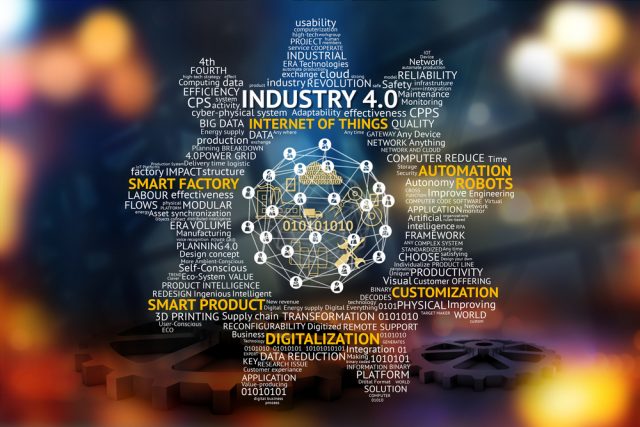
By Julio Gil-Pulgar,
Bitcoin, the blockchain, artificial intelligence, the Internet of Things and other Fourth Industrial Revolution technologies are disrupting everything around us. In particular, they are disrupting the way we manage people and businesses. Furthermore, they are changing management approaches and fostering new business process creation.
Industrial Revolutions and Management Evolution
 We have already experienced profound change in response to an eruption of new technologies. For example, the Industrial Revolution that started in the 1760s brought new production processes and changed management science.
We have already experienced profound change in response to an eruption of new technologies. For example, the Industrial Revolution that started in the 1760s brought new production processes and changed management science.
Certainly, management science existed before the Industrial Revolution. This fact is demonstrated by, for example, the existence of the Egyptian pyramids and the Great Wall of China.
However, the Industrial Revolution led to new management theories, culminating with Frederick Taylor’s principles of scientific management. These principles include large-scale manufacturing and assembly-line production. They emphasize the rationalization and standardization of work through time and motion studies, division of labor, work measurement, and piece-rate wages.
Then, in the mid-1990s, computers and the Internet propelled the Third Industrial Revolution. Exploiting the prevalence of information technologies, managers reengineered business processes.
Reengineering, as defined by Dr. Michael Hammer and Dr. James Champy, is:
“The fundamental rethinking and radical redesign of the business process to achieve dramatic improvements in critical contemporary measures of performance, such as cost, quality, service, and speed.”
Now, the Fourth Industrial Revolution, i.e.: Industry 4.0, brings deeper change. As Klaus Schwab, Executive Chairman, World Economic Forum, declared, “One of the main features of the Fourth Industrial Revolution is that it does not change what we are doing, it changes us.”
Blockchain and Innovation Management
 Blockchain could bring pervasive change at a magnitude and speed never before experienced.
Blockchain could bring pervasive change at a magnitude and speed never before experienced.
“On the business side, it drastically modifies customer expectations, product enhancement, collaborative innovation and organizational forms,” according to the European Commission.
To exploit the power of emerging new technologies, leaders and managers must become more sophisticated at innovation management.
Bitcoin and its blockchain are driving innovation across several industries. Therefore, it is imperative that managers become proficient at handling new concepts. These include the technology itself: trustless, distributed, permissionless, immutable, borderless, decentralized, and open source.
Thanks to these concepts, many executives and entrepreneurs envision the future corporation through the prism of open innovation and blockchain.
“Those that will succeed will be those that are best able to integrate innovation systematically into all aspects of the organization, to drive a higher rate of innovation in new business areas, and to manage innovation resources effectively and flexibly in a truly globalized and decentralized world,” concludes a report from Arthur D. Little.
Moreover, the advent of smart contracts that can control the millions of interconnected smart devices, which execute transactions without human intervention, are requiring innovators to be able to design, deliver and manage smarter products. To achieve these objectives, IBM has developed a new approach, insight and product innovation (IPI).
Harnessing the Power of Bitcoin’s Blockchain
 Specifically, emerging technologies combined with blockchain-based smart contracts are altering the way companies manage key processes, such as finances, logistics, audits, and trade. They are even reshaping the corporate structure.
Specifically, emerging technologies combined with blockchain-based smart contracts are altering the way companies manage key processes, such as finances, logistics, audits, and trade. They are even reshaping the corporate structure.
Thus, to remain competitive, companies are feverishly trying to gain expertise to harness the this power. For instance, “Big Four” companies are working towards bringing blockchain-based technologies and services to their clients.
Deloitte is working with startup Bloq “to develop blockchain-related prototypes addressing digital identity, digital banking, cross-border payments, loyalty and rewards, as well as products for the investment management and insurance sectors.”
Deloitte is also combining cognitive technologies, the Internet of Things, and blockchain, through its Deloitte Catalyst initiative. Deloitte CEO Cathy Engelbert said, “Deloitte Catalyst is enabling Deloitte and our clients to more easily tap the power of innovation.”
Others Also Exploring New Solutions
Similarly, Ernst and Young is focusing on building blockchain-based solutions and prototypes. In this program, EY is collaborating with several blockchain forerunners:Adjoint, BlockVerify, Bitfury, BTL Group Ltd., Jaak, and Tallystiks.
For 2016, EY’s program has been exploring blockchain applications in digital rights management for the media and entertainment sectors, and energy trading for the power and energy sectors.
Also, PwC is partnering with Blockstream to introduce blockchain solutions to its clients around the world. “Together, PwC and Blockstream will help clients by collaborating on existing solutions and developing offerings to enable companies to meet new competition, adapt to disruptive market forces and lead innovation,” said Alex Fowler, SVP, Blockstream, announcing the partnership.
Certainly, the Fourth Industrial Revolution presents huge opportunities and challenges all around, particularly in the production and distribution of wealth. In this regard, Bitcoin and its blockchain are playing a vital role. However, to enhance these opportunities and minimize these challenges, management science must be adapted to enable innovators to collaborate and reimagine new business processes.













